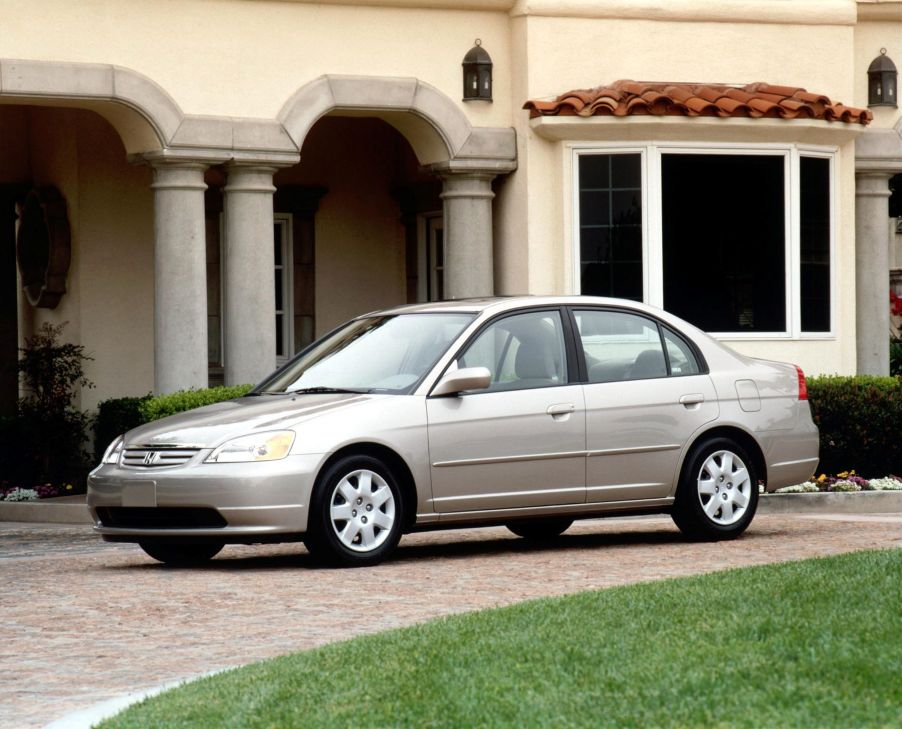
Early Accolades for the 2001 Honda Civic Show the Problem With Car Reviews
New car reviews are a partial story. First and foremost, reviewers strive to communicate driving dynamics, comfort, features, and fit and finish, among other things. Reviewers and automotive journalists compile specs and may even make direct comparisons to a car’s competitor to best educate potential buyers on what vehicle suits them best. Unfortunately, journalists couldn’t see the future of many problematic models, including the 2001 Honda Civic.
Early reviews for the 2001 Honda Civic were extremely positive

The 2001 Honda Civic was the first year of the seventh generation. This generation saw several changes that journalists praised at the time. In an article from December 2000, MotorTrend’s Scott Mead writes, “Honda giveth: more performance, additional cabin room, extra safety features, and the sweetest, crispest shifter I’ve ever experienced in a front-drive car.” Though the seventh-gen Civic was not perfect by any stretch of the imagination, and many were disappointed by the change from double wishbone suspension to MacPherson struts, first impressions were almost universally good.
In the same MotorTrend article, Mead goes on to say, “Getting behind the wheel of any Honda Civic means that I’m to be driving a fun, tossable urban appliance. The new model is not a disappointment; in fact, it truly raises the bar.” High praise from a respected publication. The base 1.7L non-VTEC engine was not given much praise. Still, the cabin noise was drastically reduced through liquid-filled engine mounts, more sound deadening, and greater structural rigidity, reports AutoBlog. The new generation Civic also impressed with its increased comfort and three additional cubic ft of passenger space, making it a far more attractive option for family transportation.
The praise was initially justified
Despite having reliability issues, the 2001 Honda Civic was an excellent car. With just a few minutes and an internet connection, you can find article after article from the early 2000s praising the seventh-generation Honda Civic.
In his MotorTrend article, Mead goes as far as to write, “Still, this is a happy, well-balanced, energetic, high-quality, sure-to-be-reliable piece that just works.” Given the eventual discovery that the 2001 model would have widespread and catastrophic transmission failures, airbag issues, and even exhaust manifold problems, this comment comes with some irony.
This is not to say that the praise wasn’t justified, but these reviews couldn’t factor in long-term reliability. The good things these writers point out about the Civic were true. However, the assumption that it would be as reliable as the previous gen wasn’t true at all. This generation is a major improvement over its previous iterations, and it is an exceptional car for the time, but we can’t ignore the elephant in the room. Sadly, journalists at the time had no way of knowing what issues this new Civic and its owners would be cursed with.
The automatics Civics were nightmares
The most devastating issue with the 2001 Honda Civic is the automatic transmission. According to CarComplaints, the 2001 Civic has the most reported problems of any Honda Civic and is ranked as the worst model year for the Civic nameplate. Of the 1,227 reported issues, 898 of them are transmission related. Of those 898, 681 were reported transmission failures. The average reported mileage the four-speed automatic managed to cover before failure was 104,000 miles, and the repair cost averaged $2,300. However, one user reported having a failure and 71k miles and was quoted $4,700 by a Honda dealer. Thankfully, others seemed to find replacements for far less, and those who opted for the five-speed manual don’t have to deal with these premature failures at all.
Deadly airbags required a recall of the 2001 Honda Civic
By 2023, most have heard of the Takata airbag recall. According to Car and Driver, this recall has affected millions of cars, including the 2001 Civic. The NHTSA has posted all the recalls for each year, make, and model. The 2001 Honda Civic has seven recalls that are related to airbags. The primary concern is the inflator exploding, resulting in sharp pieces of metal harming the passengers. According to Consumer Reports, 23 have died, and 400 injuries have been reported in relation to the Takata airbag recall. Thankfully, most reports on CarComplaints have to do with pesky airbag lights being on and not something more serious.
Even Honda has engine problems
One thing Honda usually does well is engines. That is largely the case with the 2001 Honda Civic and the seventh generation, but some problems were reported. The 2001 Civic has 98 reported engine problems, with 2/3 being exhaust manifold related. There were also several owners reporting prematurely cracked manifolds. Thankfully, an exhaust manifold can be replaced and shouldn’t destroy your bank account.
Never buy the first model year
Most of the time, Honda makes very reliable cars. Though the 2001 Honda Civic ended up being quite unreliable, it was reasonable to assume it would be dependable at the time. Similarly, it’s easy to assume the Mk5 Toyota Supra will be unreliable because it’s a BMW engine, but don’t discount that B58—so far, so good. We also can’t assume a Honda or Toyota will be reliable just because they always have been.
Automotive journalists may say a car is a great purchase and perhaps it is, but any car with issues this severe is not a car worth buying. Car reviews just can’t account for true long-term data on reliability. That said, with 20 years of hindsight, a 2002 or newer seventh-generation Civic is a solid option—especially with a manual transmission. Just remember, no matter how well we say it drives, don’t ever buy the first model year of a new generation.



